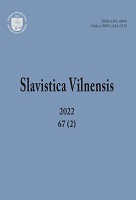Hapax legomena в Книге Иова и их рецепция в восточнославянских библиях XV–XVI вв.
Hapax legomena in the Book of Job and their Reception in East Slavic Bibles of the 15th–16th Centuries
Author(s): Alla Kozhinova, Alena SourkovaSubject(s): Cultural history, Social history, 15th Century, Eastern Orthodoxy, Translation Studies, Sociology of Religion, Sociology of Literature
Published by: Vilniaus Universiteto Leidykla
Keywords: The Book of Job; theVilnius Old Testament Florilegium (F 19–262); the Bible (Bibliia ruska) by Franсis Skoryna; the Venetian bible; the Gennadius bible; the Ostrog Bible; the Radziviłł (Brest) Bible;
Summary/Abstract: The article deals with the lexical correspondences to the Hebrew hapax legomena in the Book of Job, presented in the translation of Job into Ruthenian (prosta(ja) mova) as a part of the Vilnius Old Testament Florilegium (F 19–262) (approx. 1517–1533) and in the Bible by Francis Skoryna (1517–1519). Both versions are compared with the handwritten Church Slavonic Gennadius Bible (1499) and the printed Ostrog Bible (1581). Two Polish bibles — Radziviłł (Brest) Bible (1563) and the Nesvizh Bible (1568–1572) by Symon Budny — are considered as well. Special attention was given to the cases when translations of biblical hapaxes were the result of prescriptive (conditioned by the canonical context and traditional exegesis) activity of translators. In such cases, the knowledge of implicit information that should be verified in the translation was of particular importance. On the other hand, we analyze the translations of unfamiliar words resulting from conjectural variation, when hapaxes were interpreted on the basis of grammatical and syntactic norms and according to the meaning of the context. Not devoid of subjectivity, such variants were often transferred into subsequent translations, turning into dogmatized formulations. During historical development of the original language, the conjectural translation of individual words and entire text fragments partly compensate the translator's lack of the necessary linguistic and extralinguistic information. Thus, while working on the translation of the Book of Job at the end of the 15th–16th centuries, the translators of the Grand Duchy of Lithuania had to solve a number of problems — from searching for their own translations’ versions when interpreting "dark" passages to the need to meet those normative guidelines that were dictated by biblical translations, exegetical writings, and other authoritative texts.
Journal: Slavistica Vilnensis
- Issue Year: 67/2022
- Issue No: 2
- Page Range: 24-39
- Page Count: 16
- Language: Russian

